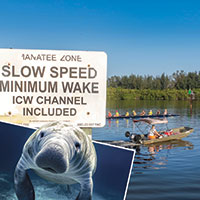 Boat speed limits may be raised in some Manatee Zones
Boat speed limits may be raised in some Manatee Zones
STORY BY JON PINE (Week of July 24, 2025)
The Florida Fish and Wildlife Conservation Commission is floating the idea of dramatically increasing boat speed limits in a number of local spots where West Indies manatees hang out.
Boat injuries, including blunt force trauma from boat strikes and gashes caused by propellers, are the main cause of manatee deaths. Speed zones in waters where manatees congregate have protected the slow-moving mammals for more than 47 years.
Since these protections were put in place, the number of manatees in Florida has increased from an estimated low of 1,267 to approximately 8,350 today.
Now, the FWC has identified a dozen areas in Indian River County where it thinks speed zone changes might be appropriate, including John’s Island Creek, Grand Harbor near its marina, the canals in Vero Isles and coves in The Moorings.
In those locations and four others, FWC has suggested the possibility of increasing speed limits from approximately 5 miles an hour to 25 mph. It’s also identified two zones where speed limits would be imposed for the first time and one in which the speed limit for boats would be reduced by 5 mph, from 30 mph to 25 mph.
“These are just preliminary proposed changes,” said Melissa Meisenburg, the county’s senior lagoon environmental specialist.
In response to a request from FWC, the county is creating a Local Rule Review Committee to evaluate possible new or amended manatee speed zones. The 14-member committee will consist equally of those who use the waterways for business or pleasure and representatives from environmental organizations involved in protecting manatees.
Each of the five county commissioners will appoint one waterway user and one environmental advocate, and county staff will select four additional members from a pool of applicants wishing to serve on the committee. Applications are available on the county’s website.
Once formed, the committee has 60 days to review the rules and make a report to the FWC. If changes are recommended, FWC staff will solicit public comment and then hold a final public hearing; 20 days later, the final changes will be adopted and new signs will be made, where necessary. The entire process will be completed next February.
This will be the first time the county’s manatee speed zone regulations have been reviewed since 2002.
Presently, local manatee speed zones are categorized as:
• No Entry Zone: No boats allowed, except to access private residences or docks.
• Idle Speed Zone: Boats must travel at the slowest speed possible while maintaining steerage, typically 3-5 mph
• Slow Speed Zone: Boats must travel at a speed no greater than what is reasonable or prudent, generally 25 mph or slower.
• 30 Miles Per Hour Zone: This zone is usually located within the Intracoastal Waterway Channel and inlet channels.
“We look forward to working with FWC and our community during this review process to improve manatee protection zones where needed and to support our waterway users,” Meisenburg added.
Descended from grazing land animals, manatees can reach 13 feet in length and weigh as much as 3,000 pounds, although adults typically are 9 or 10 feet long and weigh 1,000 to 1,200 pounds. They are considered by many scientists to be as intelligent as bottlenose dolphins, with a complex language, strong long-term memory and the ability to learn complex tasks, according to Save the Manatee Club.



